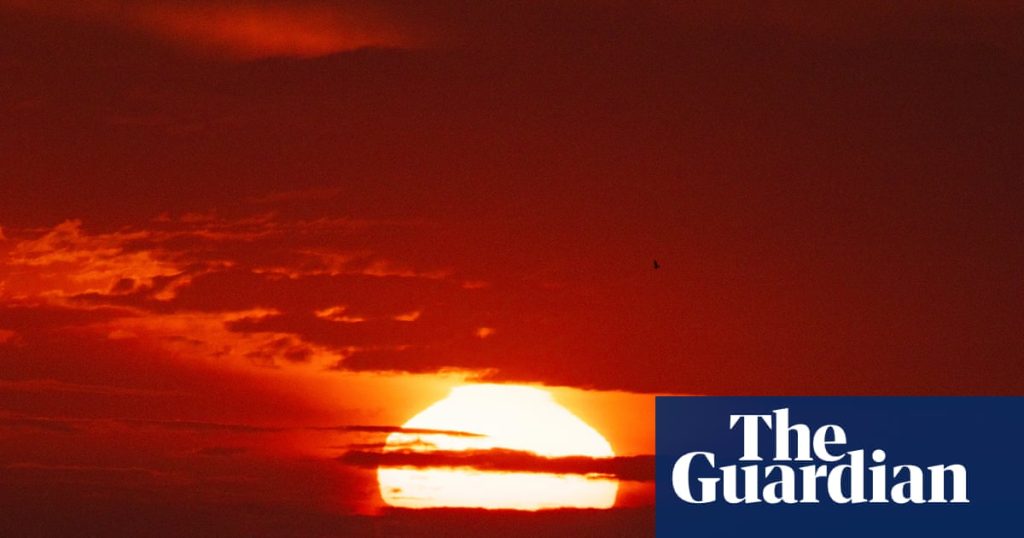Coalition MPs weighing up whether to abandon net zero have been briefed on research that argued “heat deaths aren’t a thing”, played down the prospect of substantial sea level rises and claimed “no one has ever made low-cost energy” from wind and solar.
Guardian Australia has viewed slides from a presentation the conservative thinktank Centre for Independent Studies (CIS) gave to MPs in Canberra this week, along with the findings of private polling on net zero.
The briefing was arranged by a Coalition backbench committee and aimed to inform internal debate on policies, including the contentious climate target.
The “net zero voter research” presented to MPs found 32% of 1,010 respondents wanted the target to remain, while 16% wanted it “scrapped entirely”.
The remaining 52% wanted the target “changed to more flexible, realistic, and achievable goals”, according to polling from Insights Portal viewed by Guardian Australia.
That third option has emerged as the most likely landing spot for the Coalition under a compromise designed to win the broadest support in a party room that is deeply divided on climate policy.
Among the options discussed internally, all of which would represent a watering-down of the Peter Dutton-era policy, were committing to repeal Labor’s legislated climate targets, delaying the net zero deadline, and carving out certain industries, including agriculture.
Just 9% of respondents to the poll supported extending the net-zero deadline when presented with various options to change the target.
Guardian Australia was unable to independently verify who commissioned the poll.
Sign up: AU Breaking News email
But Coalition sources familiar with the briefing said MPs were told it was funded by an anonymous “high net-worth individual” – not the party.
Ahead of a scheduled meeting to debate net zero on Friday, about 20 MPs Coalition attended Monday’s briefing to learn about the polling, as well as research from the CIS.
The backbench committee – run by Jane Hume and Simon Kennedy – has invited various groups, including the Blueprint Institute, McKinsey and Broken Bay Associates, to brief MPs with different perspectives about the energy debate.
The CIS’ 60-slide presentation on Monday – titled “What matters in the energy debate” – included anti-net zero cartoons and graphs questioning the impacts of climate change, the cost of renewables and the work of government agencies including the Australian Energy Market Operator (Aemo) and Commonwealth Scientific and Industrial Research Organisation (CISRO)
One slide was titled “heat deaths aren’t a thing”, citing graphs included in September’s climate risk assessment as supposed evidence.
The slide did not mention the same report found that heat-related deaths could increase by 444% in Sydney if global heating surpassed 3C.
Another slide was headed “small sea-level rises are certain. Large ones aren’t”, while another was titled “no one has ever made low-cost energy from wind and solar”.
A Coalition source, speaking on the condition of anonymity, was alarmed at the briefing.
“To hear from them (CIS) was an important part of the policy review process,” they said.
“(But) you could not help but to think that we heard from a thinktank with a special affection for coal. Disappointingly there was little to no consideration of environmental impacts.”
Sign up to Breaking News Australia
Get the most important news as it breaks
Privacy Notice: Newsletters may contain information about charities, online ads, and content funded by outside parties. If you do not have an account, we will create a guest account for you on theguardian.com to send you this newsletter. You can complete full registration at any time. For more information about how we use your data see our Privacy Policy. We use Google reCaptcha to protect our website and the Google Privacy Policy and Terms of Service apply.
after newsletter promotion
In a statement to Guardian Australia, the CIS executive director, Michael Stutchburydefended the thinktank’s research.
“CIS research is providing the best explanation for why the rapid injection of intermittent solar and wind generation into the electricity grid has been accompanied by the loss of Australia’s traditional cheap energy advantage,” he said.
In response to suggestions the CIS was too pro-coal, Stutchbury said the thinktank had a technology agonistic approach to the energy transition.
“But we also insist they must be cost-effective and not contribute to raising prices for Australian households,” he said.
The private polling presented to MPs covered several other questions about net zero and energy prices, including ones that canvassed delaying the transition and increasing the use of coal and gas.
For example, respondents were asked if they would support delaying the net zero target if it meant “lower prices and more reliable energy”. About 63% said they would support that option, 19% were unsure and 18% said no.
Dr Dorian von Freyhold from Insights Portal, who prepared the polling, declined to comment when contacted by Guardian Australia.
Meanwhile, Hume on Tuesday announced she would introduce a private member’s bill to lift the nuclear energy ban, renewing her party’s pursuit of the energy source just months after it was rejected at the federal election.
Hume’s bill would repeal the John Howard-era nuclear moratorium and allow the Clean Energy Finance Corporation and Australian Renewable Energy Agency to invest in the technology.
The senator’s proposal is a substantially watered-down version of the policy the Coalition took to the May election, which involved replacing retired coal-fired power stations with taxpayer-funded nuclear reactors at seven sites nationwide.
“If you’re serious about getting emissions down, you’ve got to have all options on the table,” she said.
“If you’re not technology agnostic, well then your real objective is about blanketing the country in renewable energy projects, rather than genuinely lowering emissions and energy prices. The only way to be technology agnostic is to remove the moratorium on nuclear energy.”

